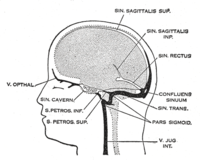
Photo from wikipedia
Background and Purpose— Pregnancy is associated with increased risk of venous thrombotic events, including cerebral venous thrombosis. We aimed to study the complications and outcome of subsequent pregnancies in women… Click to show full abstract
Background and Purpose— Pregnancy is associated with increased risk of venous thrombotic events, including cerebral venous thrombosis. We aimed to study the complications and outcome of subsequent pregnancies in women with previous cerebral venous thrombosis. Methods— Follow-up study of women with acute cerebral venous thrombosis at childbearing age included in a previously described cohort (International Study of Cerebral Vein and Dural Sinus Thrombosis). Patients were interviewed by local neurologists to assess rate of venous thrombotic events, pregnancy outcomes, and antithrombotic prophylaxis during subsequent pregnancies. Results— A total of 119 women were included, with a median follow-up of 14 years. Eighty-two new pregnancies occurred in 47 women. In 83% (68 of 82), some form of antithrombotic prophylaxis was given during at least 1 trimester of pregnancy or puerperium. Venous thrombotic events occurred in 3 pregnancies, including 1 recurrent cerebral venous thrombosis. Two of the 3 women were on prophylactic low-molecular-weight heparin at the time of the event. Outcomes of pregnancies were 51 full-term newborns, 9 preterm births, 2 stillbirths, and 20 abortions (14 spontaneous). Conclusions— In women with prior cerebral venous thrombosis, recurrent venous thrombotic events during subsequent pregnancies are infrequent.
Journal Title: Stroke
Year Published: 2017
Link to full text (if available)
Share on Social Media: Sign Up to like & get
recommendations!